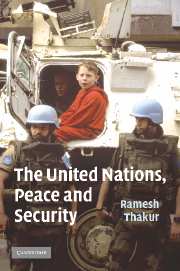Book contents
- Frontmatter
- Contents
- List of figures
- List of tables
- Foreword, Gareth Evans
- Acknowledgements
- Introduction
- PART I An international organisation for keeping the peace
- 1 Pacific settlement, collective security and international peacekeeping
- 2 Peace operations and the UN–US relationship
- PART II Soft security perspectives
- PART III Hard security issues
- PART IV Institutional developments
- Conclusion: at the crossroads of ideals and reality
- Index
1 - Pacific settlement, collective security and international peacekeeping
Published online by Cambridge University Press: 24 May 2010
- Frontmatter
- Contents
- List of figures
- List of tables
- Foreword, Gareth Evans
- Acknowledgements
- Introduction
- PART I An international organisation for keeping the peace
- 1 Pacific settlement, collective security and international peacekeeping
- 2 Peace operations and the UN–US relationship
- PART II Soft security perspectives
- PART III Hard security issues
- PART IV Institutional developments
- Conclusion: at the crossroads of ideals and reality
- Index
Summary
International organisation
This chapter situates the changing peace and security role of the United Nations within the larger context of developments in international organisation and the evolution from pacific settlement and collective security to peacekeeping and peace operations. One of the most enduring if least endearing features of human history is systematic violence between members of the human family. In the modern era, this has taken the form of organised warfare between states as the basic unit of the international system. International organisation is an important means for arranging the functioning of the state-based international system more satisfactorily than had proven possible in conditions of international anarchy.
But international organisation in turn is characterised by a certain tension. On the one hand, it can be regarded as a step towards the establishment of a world government which would transcend the state system. On the other hand, international organisations are set up and managed by nation-states; the sovereign state remains the basic entity of international relations; and states have shown themselves singularly reluctant to accept significant encroachments upon their sovereignties. Thus international organisation, in addition to serving as a possible pointer to a future world government, can also be viewed as merely an agreement by, for and of states to engage in regular consultation and establish joint machinery for the formulation and implementation of collective decisions.
There was a spurt in the number and types of international organisations in the second half of the twentieth century.
- Type
- Chapter
- Information
- The United Nations, Peace and SecurityFrom Collective Security to the Responsibility to Protect, pp. 27 - 47Publisher: Cambridge University PressPrint publication year: 2006



